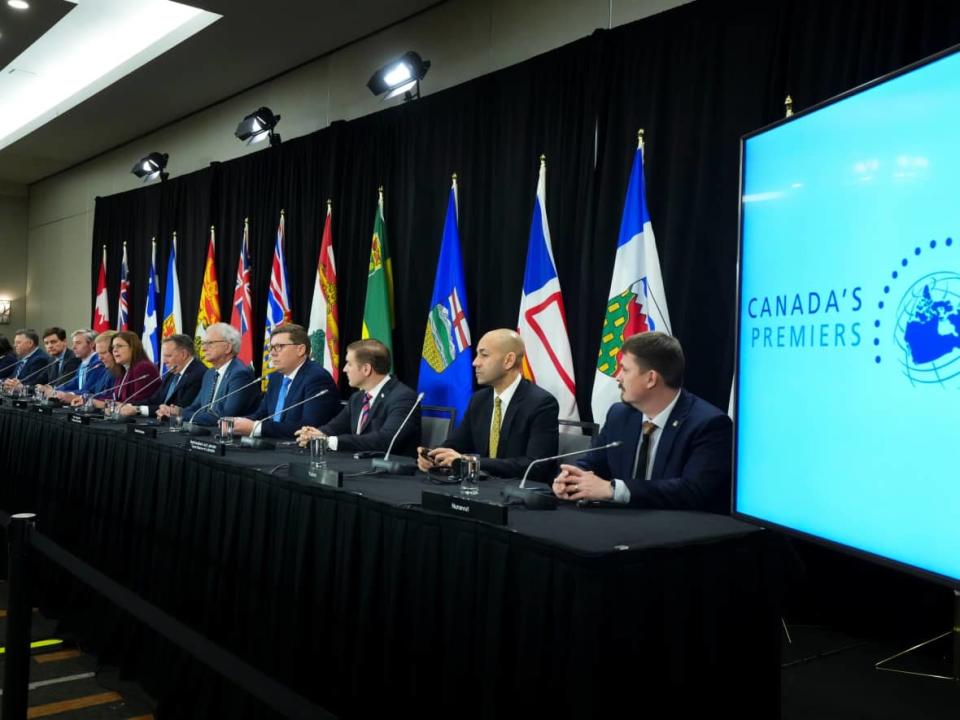Premiers will answer to voters if cash injection doesn't improve the health system: LeBlanc

As the federal government prepares to drop billions of dollars in new funding on Canada's health-care system, the minister responsible for federal-provincial relations warns that premiers will be held accountable by voters if that money doesn't lead to results.
Prime Minister Justin Trudeau met with Canada's premiers last week to pitch a plan to send roughly $46.2 billion in new money to the provinces and territories over 10 years to help prop up a faltering health-care system.
Premiers had been calling on Ottawa for months to boost its share of health-care spending. The federal government maintained that certain conditions had to be met before any money started to flow.
Intergovernmental Affairs Minister Dominic LeBlanc was asked on CBC News Network's Rosemary Barton Live if the proposed funding could be clawed back if provinces fail to achieve desired outcomes.
WATCH | Intergovernmental affairs minister discusses health-care offer:
LeBlanc didn't say if clawbacks are an option, but he did suggest premiers will have to answer to voters if they don't see improvements in provincial health-care systems.
"The provincial governments will obviously be sensitive in front of their citizens and their voters in terms of those outcomes," LeBlanc told host Rosemary Barton in an interview airing Sunday.
Ottawa's proposal includes a top-up to the Canada Health Transfer (CHT) and new money directed at four priority areas: family health services, health workers and backlogs, mental health and substance use and a "modernized health system."
To access the enhanced CHT, provinces must first commit to improving how health data is "collected, shared, used and reported to Canadians to promote greater transparency on results, and to help manage public health emergencies," the government said in a background document supplied to reporters.
The funding for the shared priorities will also be contingent on the provinces and territories developing "action plans" detailing how these funds will be spent and how progress will be measured.
LeBlanc said allowing taxpayers to track the progress being made by their provincial governments will allow them to decide if federal funding is being used effectively.
"We think that's the best way to drive sustained change, is to have this transparency. And then the taxpayers, the voters in each jurisdiction, will be able to see how a province or territory did," he said.
WATCH | N.B. premier talks about upcoming meeting Monday:
The premiers were non-committal about the plan after seeing the fine print for the first time. They said they'd take time to review Trudeau's offer before either accepting the terms or demanding more.
Manitoba Premier Heather Stefanson — currently the head of the Council of the Federation, the group that represents the premiers — said premiers were "disappointed" by the size of Trudeau's proposal.
"It's significantly less than what we're looking for," she said.
The premiers had been asking Ottawa to increase its CHT contributions to provinces by $28 billion a year. Trudeau's government is proposing instead an immediate $2-billion boost with a five per cent annual hike over the next five years.
In a separate interview on Rosemary Barton Live, Quebec's finance minister said the proposal was much worse than what he had imagined.
"This was probably in the neighbourhood of 50 per cent of my worst-case scenario," Eric Girard told Barton.
WATCH | Quebec finance minister responds to health-care offer:
Girard said the federal offer is a drop in the bucket compared to what Quebec spends on health care, which accounts for 43 per cent of the province's budget.
"The offer that has been tabled will not make a difference," he said.
Speaking to reporters last week, Trudeau was asked multiple times if this proposal was his final offer.
"This is the offer we put forward on the table," he said. "This is the billions of dollars that are there for provinces and we certainly look forward to working with them to be able to deliver not just that money, but those health-care improvements to citizens across the country."

The premiers are expected to meet Monday to discuss the federal proposal.
New Brunswick Premier Blaine Higgs told Rosemary Barton Live that he felt confident an agreement with the federal government will be reached soon.
"I do feel that over the coming few weeks, we will indeed be able to arrive at a solution and a path forward with the federal government," he told Barton in an interview airing Sunday.
Higgs also said he supports making public the metrics showing how the health system is performing.
"I'm quite all right with that because I think it's important now to put actual success and results behind dollars being spent," he said.

